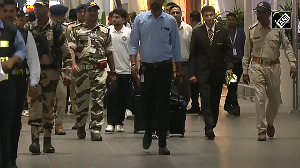"Iraq was invaded and is now under occupation," Lakhdar Brahimi, United Nation's special envoy to Afghanistan, told Worldview India in a rare and exclusive interview.
"No matter what the people of Iraq say, the reality is that it is currently under occupation," he said.
Asked how he would compare Iraq with Afghanistan, the last country the American-led coalition went to war with, Brahimi said that there is a fundamental difference between the two since "Afghanistan was not invaded."
He elaborated further, saying: "This war [Iraq] was not necessary. It was not legitimate. The only encouraging thing about the Iraqi situation is that people have discovered that there is legality. The use of force cannot be obtained anywhere else except from the United Nations and it wasn't there in the Iraq situation."
On the deteriorating security situation in Afghanistan, which saw the targetted killing of two foreigners in the last fortnight, and the need for political and military stability, Brahimi once again did not mince words. "Lets call things by their name,'' said Brahimi, adding, "If you want a country to stop being a hotbed and breeding place for terrorists, you cannot do it by running after individuals. The Americans were saying at one time that they are not interested in nation-building and that they are fighting terrorists, but I think they realise that fighting terrorism is not about running with a gun and a horse and going after the baddies. Its done through reconstruction."
On the reconstruction effort going on in Afghanistan since the Taliban regime was ousted in November, 2001, Brahimi admitted that the work had been slow and that they had nothing much to show people on the ground. Saying that it would accelerate a "little bit" this year, he cautioned that they needed "two years for the peace process to become irreversible and at least five years for the country to stand on its own two feet."
Brahimi denied charges that political stability was not taking root because the UN was doing all the work itself and not through the Hamid Karzai government. "From the day we arrived here when there was practically no government, we have been extremely conscious of the necessity to be in a position of supporting the government, rather than leading. We have never wanted or tried to occupy the driving seat and are aware of the fact that we are foreigners and are here to help Afghanistan get on its own two feet. We are neither patronising nor pretending to lead,'' said Brahimi.





